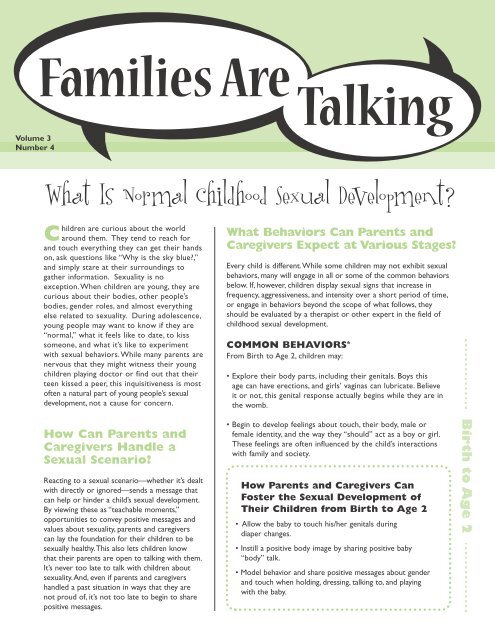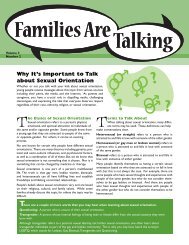What Is Normal Childhood Sexual Development? - Sex Ed Solutions
What Is Normal Childhood Sexual Development? - Sex Ed Solutions
What Is Normal Childhood Sexual Development? - Sex Ed Solutions
- No tags were found...
You also want an ePaper? Increase the reach of your titles
YUMPU automatically turns print PDFs into web optimized ePapers that Google loves.
Volume 3Number 4<strong>What</strong> <strong>Is</strong> <strong>Normal</strong> <strong>Childhood</strong> <strong><strong>Sex</strong>ual</strong> <strong>Development</strong>?Children are curious about the worldaround them. They tend to reach forand touch everything they can get their handson, ask questions like “Why is the sky blue?,”and simply stare at their surroundings togather information. <strong><strong>Sex</strong>ual</strong>ity is noexception.When children are young, they arecurious about their bodies, other people’sbodies, gender roles, and almost everythingelse related to sexuality. During adolescence,young people may want to know if they are“normal,” what it feels like to date, to kisssomeone, and what it’s like to experimentwith sexual behaviors.While many parents arenervous that they might witness their youngchildren playing doctor or find out that theirteen kissed a peer, this inquisitiveness is mostoften a natural part of young people’s sexualdevelopment, not a cause for concern.<strong>What</strong> Behaviors Can Parents andCaregivers Expect at Various Stages?Every child is different.While some children may not exhibit sexualbehaviors, many will engage in all or some of the common behaviorsbelow. If, however, children display sexual signs that increase infrequency, aggressiveness, and intensity over a short period of time,or engage in behaviors beyond the scope of what follows, theyshould be evaluated by a therapist or other expert in the field ofchildhood sexual development.COMMON BEHAVIORS *From Birth to Age 2, children may:• Explore their body parts, including their genitals. Boys thisage can have erections, and girls’ vaginas can lubricate. Believeit or not, this genital response actually begins while they are inthe womb.How Can Parents andCaregivers Handle a<strong><strong>Sex</strong>ual</strong> Scenario?Reacting to a sexual scenario—whether it’s dealtwith directly or ignored—sends a message thatcan help or hinder a child’s sexual development.By viewing these as “teachable moments,”opportunities to convey positive messages andvalues about sexuality, parents and caregiverscan lay the foundation for their children to besexually healthy.This also lets children knowthat their parents are open to talking with them.It’s never too late to talk with children aboutsexuality.And, even if parents and caregivershandled a past situation in ways that they arenot proud of, it’s not too late to begin to sharepositive messages.• Begin to develop feelings about touch, their body, male orfemale identity, and the way they “should” act as a boy or girl.These feelings are often influenced by the child’s interactionswith family and society.How Parents and Caregivers CanFoster the <strong><strong>Sex</strong>ual</strong> <strong>Development</strong> ofTheir Children from Birth to Age 2• Allow the baby to touch his/her genitals duringdiaper changes.• Instill a positive body image by sharing positive baby“body” talk.• Model behavior and share positive messages about genderand touch when holding, dressing, talking to, and playingwith the baby.Birth to Age 2
Ages 9 to 12 Ages 3 to 8COMMON BEHAVIORS *Children Ages 3 to 4 may:• Become increasingly curious about their bodies.Knowing that touching their genitals feels good, theymay begin to masturbate by stimulating themselveswith their hand or rocking against a stuffed animal,which may or may not lead to orgasm.• Establish that they are a boy or a girl. However,while playing they may pretend to be the othergender.• Be inquisitive about body differences and voluntarilyplay house, doctor, or explore other forms of sexualplay with friends or siblings that are close in age anddevelopmental level. If they play alone, they mightundress their dolls to see their genitals.• Express interest in words associated with bathroombehaviors, show curiosity about how males andfemales use the toilet, repeat “curse” wordsthat they hear, and start to ask sexuality-relatedquestions like “Where did I come from?”COMMON BEHAVIORS *Children Ages 5 to 8 may:• Continue sex play and masturbation.• Become very curious about pregnancy and birth.• Form strong same-sex friendships. Girls tend toform close intimate bonds with one or two othergirls. Boys usually play in larger groups and theirplay is usually oriented around activities.• Show strong interest in stereotypical male andfemale roles, regardless of parents’ approach tochildrearing.COMMON BEHAVIORS *Children Ages 9 to 12 may:• Become more modest and desire privacy as they beginpuberty.• Be more curious about developed male and female bodies.• Look at erotic magazines and Internet sites.• Develop romantic crushes on friends, older teens,celebrities, and other people that play a role in their lifelike a teacher, coach, or counselor.• Show an interest in dating.• Wonder “Am I normal?” and compare themselves to others.• Experience pressure to conform to family and societalexpectations of appropriate behavior for boys and girls.• Use sexual language and explore romantic and sexualfantasies.• Masturbate to a deeper, more adult-style orgasm.How Parents and Caregivers CanFoster the <strong><strong>Sex</strong>ual</strong> <strong>Development</strong> ofTheir Children Ages 3 to 8:• Explain in a calm tone that while touching the genitalscan feel good, it is to be done in a private place like theirbedroom.• When finding a child engaged in sex play with another child,gently ask them what they are doing so that thescenario can be understood from the child’s perspective. Itis important to remove the adult lens and see the behaviorfrom the child’s point of view.This will help parents understandthat more often than not, the behavior is not eroticallyfocused but motivated by curiosity.• Parents can then explain that one’s penis/vulva/buttocks etc.are considered to be private, and that no one should touchtheir “private parts” except for health reasons or to cleanthem.• Give the child anatomically correct dolls to help them understandthat girls and boys have many body parts that are thesame and some that are different.• Read age-appropriate sexuality books with the child to helplay the foundation for them to grow up sexually healthy.• Continue to model appropriate behavior and share positivemessages about gender and other aspects of sexuality thatarise.• Use proper terms to name body parts, including the genitals.• Follow up children’s questions age-appropriately by askingquestions like “<strong>What</strong> do you think?” This will give parents anidea of what they are really asking and help give an indicationof what they are ready to learn.How Parents and Caregivers CanFoster the <strong><strong>Sex</strong>ual</strong> <strong>Development</strong>of Their Children Ages 9 to 12:• Respect the pre-teen’s desire for privacy.• Share family values about dating and love.• Help pre-teens develop decision-making,communication, and assertiveness skills.• Continue to model appropriate behavior and sharepositive messages about sexuality-related issues.• Continue to answer pre-teen’s questions and sharemessages about various topics and family values.• Give the pre-teen age-appropriate sexuality books.• Let the pre-teen know that they have support.
Ages 13 to 18COMMON BEHAVIORSChildren Ages 13 to 18 may:• Want to date.• Feel pressured by peers to engage in activities, includingsexual behaviors that they might not be ready toexperience, but go along with because they want tobe perceived as “cool.”• Continue to masturbate.• Fantasize about romantic or sexual scenarios.• Fall in love.• Experiment with kissing and touching that may includeoral sex and intercourse.How Parents and Caregivers CanFoster the <strong><strong>Sex</strong>ual</strong> <strong>Development</strong> ofTheir Children Ages 13 to 18:• Continue to model appropriate behavior and sharepositive messages about sexuality-related issues.• Continue to answer pre-teen’s/teen’s questions andshare messages about various topics and family values.• Give the pre-teen/teen age-appropriate sexuality books.• Let the pre-teen/teen know that they have support.*Some of the common behaviors listed were taken from the book The Subject <strong>Is</strong> <strong>Sex</strong>by Pamela M.Wilson, M.S.W., Marcia Quackenbush, M.S., M.F.T., C.H.E.S., and William M. Kane, Ph.D., C.H.E.S.Now <strong>What</strong>Do I Do?The following step-by-step process can help parents andcaregivers address sexuality-related circumstances head-onby simply seeing the scenario through the child’s eyes, thinkingabout what they want to teach their child, and choosing themessages they want to share. Below is an example of a scenarioregarding gender roles, but this process can be used no matterhow old the child is or what issues arise.Topic: GENDER ROLESImagine the Scenario:You enter your five-year-old son’sroom and find him changing the diaper on the baby doll belongingto his friend Mary. He asks “Will you buy me a baby doll like this?”Step One: Ask Yourself…Why is he doing that?• He may have seen it advertised on television.• He wants something his friend has.• It’s a different and interesting kind of toy for him. None of theother boys he knows has a doll.• He has seen adults change diapers.• He’s having fun playing Daddy.Step Two: Say to Yourself…Now what do I do? <strong>What</strong> are some of the messages that I want toteach my child about gender roles?• Girls and boys have many similarities and a few differences.• Some people may expect or demand that boys and girlsbehave in certain ways, but this is beginning to change.Tackle TheseResources to MakeTalking EasierFor books that help parents and caregiverstalk with their children about sexuality issues, go towww.familiesaretalking.org/resources/resources_for_parents.htmlor call SIECUS to get a copy.• Both women and men can be involved and caring parents.• Boys and girls can do the same chores at home.• Men and women are capable of doing almost all thesame jobs.• Some men and women may be told that certain jobs andtasks are only for women or only for men, but this isbeginning to change.Step Three: Ask Yourself…<strong>What</strong> response will give the message I want to share?POSSIBLE RESPONSES AND MESSAGESResponse: “This is a girl’s toy. Boys don’t play with dolls.”Message: There are toys that are only for boys and toys thatare only for girls.Response: “It’s nice that you like to play Daddy.”Message: “Play is rehearsal for adult behavior. Males can do agreat job taking care of a baby.Response: “We’ll think about it.Why don’t you and Mary playwith something else?”Message: Playing with a doll is not OK at this time. If youdon’t really intend to think about it, but would rather ignorehis request, the child will likely sense that the parent doesn’tintend to follow through.
FAMILIES ARE TALKINGVolume 3, Number 42004Amy Levine, M.A.Family Project CoordinatorMonica RodriguezVice President for<strong>Ed</strong>ucation and TrainingMartha Kempner, M.A.Director of Public InformationJoseph DiNorcia, Jr.President and CEOAnna RaffDesign and LayoutFamilies Are Talking is a quarterlynewsletter published by the<strong><strong>Sex</strong>ual</strong>ity Information and<strong>Ed</strong>ucation Council of the UnitedStates (SIECUS), a nationalnonprofit organization foundedin 1964. SIECUS affirms thatsexuality is a fundamental part ofbeing human, one that is worthyof dignity and respect.Weadvocate for the right of allpeople to accurate information,comprehensive education aboutsexuality, and sexual healthservices. SIECUS works to createa world that ensures socialjustice and sexual rights. To findout more information aboutSIECUS, visit www.siecus.org.SIECUSFamily Project130 West 42nd Street, Suite 350New York, NY 10036-7802Phone: 212/819-9770Fax: 212/819-9776Policy Office1706 R Street, N.W.Washington, DC 20009Phone: 202/265-2405Fax: 202/462-2340We invite you to visitwww.familiesaretalking.orgfor more information andpublications. For informationand publications in Spanish,including the Spanish translationof this newsletter,La familia habla, visitwww.lafamiliahabla.orgJoin our listserv to receivefuture Families Are Talkingnewsletters and information.E-mail families_are_talkingsubscribe@topica.comtosubscribe.You must e-mail fromthe address you want toreceive the information.This newsletter is supportedby a grant fromThe Annie E. Casey Foundation.ASKAMYDo I need to tell the other parent that our kids were playing doctor?QThe other day, my 4-year-old daughter’s friend came home with her after school for a play-date.When I checked on them, I found them playing doctor. Do I need to tell the friend’s parent?AYes, it’s important to mention what you observed. Parents appreciate knowing what goes on withtheir children when they are not around—whether it’s that the play-date went splendidly, that thechild was given a snack after school, or that she/he fell and scraped her knee when playing outside.And, while it may not be as easy to bring up, you should also share the sexuality-related scenario andhow you handled it.If after finding out, the other parent doesn’t agree with what you did and said, don’t take it personally.The reality is that child-rearing styles vary. Nonetheless, most parents will be glad that you brought itto their attention, giving them the opportunity to share messages and values with their child.How do I handle my pre-teen viewing porn on the Internet?QMy 12-year-old son is always using the Internet. He says that he is doing homework.After checkinghis computer without his knowledge, it seems that he has been viewing adult websites, possiblyfor hours on end. How can I bring up the topic without letting him know that I “spied” on him?AWhile it’s possible that your son is deliberately looking at adult websites, it could also be thatsomeone else has used his computer or that the sites appear spontaneously as pop-up ads.<strong>What</strong>ever the case may be, the truth of the matter is that today’s youth are bombarded by sexyimages of scantily clad bodies on the Internet, billboards, television, and in magazines. Not to mention,if he hasn’t already, within the next few years, your son will be going through puberty.Whether or nothe’s looking at porn sites, he’s likely curious about how his body will look and may wonder what thefemale form looks like nude.In the meantime, if you are concerned about his computer usage, set ground rules.Try limiting hiscomputer time; moving the computer to a space where you can observe his viewing habits (youcan explain this by telling him that everyone in your family wants easy computer access); and mostimportantly, give him sites where he can find credible, age-appropriate sexuality information likewww.teenwire.com and www.scarleteen.com.As a parent, you are the primary sexuality educator of your child. So, if you haven’t already, think aboutthe messages you want to share.Then, open the dialogue and keep it open, addressing various topics asteachable moments occur. For example, use a magazine like Maxim (which is definitely for young men,but easily accessible to young boys) to illustrate that many of the models in the magazine are airbrushedto look “perfect” rather than realistic. And, let him know that many companies use sex to sell sneakers,computers, and other popular items by positioning models in very sexy poses. Flipping through themagazine, you’ll likely find a few photos to illustrate your point.As you discuss each concept, ask your sonwhat he thinks.While it may not happen overnight, hopefully over time, a full-fledgedconversation will transpire.Amy Levine, M.A., is SIECUS’ Family Project Coordinator and has worked at SIECUS for over 9years. She is certified as a sexuality educator by the American Association of <strong>Sex</strong> <strong>Ed</strong>ucators,Counselors, and Therapists. Send your questions to Amy at alevine@siecus.org or mail them toher at SIECUS, Family Project, 130 West 42nd Street, Suite 350, New York, NY 10036.Check out new Q & As at www.familiesaretalking.org/ask_amy/index.html
















